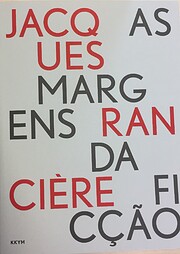

Carregue numa fotografia para ir para os Livros Google.
|
A carregar... As margens da ficção (edição 2019)por Jacques Rancière, Jorge Leandro Rosa (Tradutor)
Informação Sobre a ObraThe Edges of Fiction por Jacques Rancière
Nenhum(a) Ainda não há conversas na Discussão sobre este livro. Sem comentários sem críticas | adicionar uma crítica
What distinguishes fiction from ordinary experience is not a lack of reality but a surfeit of rationality - this was the thesis of Aristotle's Poetics. The rationality of fiction is that appearances are inverted. Fiction overturns the ordinary course of events that occur one after the other, aiming to show how the unexpected arises, happiness transforms into unhappiness and ignorance into knowledge. In the modern age, argues Rancière, this fictional rationality was developed in new ways. The social sciences extended the model of causal linkage to all spheres of human action, seeking to show us how causes produce their effects by inverting appearances and expectations. Literature took the opposite path. Instead of democratizing fictional rationality to include all human activity in the world of rational knowledge, it destroyed its principles by abolishing the limits that circumscribed a reality peculiar to fiction. It aligned itself with the rhythms of everyday life and plumbed the power of the "random moment" into which an entire life is condensed. In the avowed fictions of literature as well as in the unavowed fictions of politics, social science or journalism, the central question is the same: how to construct the perceptible forms of a shared world. From Stendhal to João Guimarães Rosa and from Marx to Sebald, via Balzac, Poe, Maupassant, Proust, Rilke, Conrad, Auerbach, Faulkner and some others, this book explores these constructions and sheds new light on the constitutive movement of modern fiction, the movement that shifted its centre of gravity from its traditional core toward those edges in which fiction gets confronted with its possible revocation. Não foram encontradas descrições de bibliotecas. |
Current DiscussionsNenhum(a)Capas populares
 Google Books — A carregar... Google Books — A carregar...GénerosSistema Decimal de Melvil (DDC)808.3Literature By Topic Rhetoric and anthologies Rhetoric of fictionClassificação da Biblioteca do Congresso dos EUA (LCC)AvaliaçãoMédia: Sem avaliações.É você?Torne-se num Autor LibraryThing. |
||||||||||||||||||||||||||||||||||||||||||||||||||||||||||||||||||||||||||||||||||||||||||||||||||||||||||||||||||||